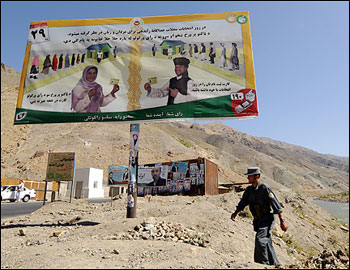A Tense Afghanistan Gears Up for National Elections
Analysts Fear Violence If Vote Lacks Credibility


|
Discussion Policy
Comments that include profanity or personal attacks or other
inappropriate comments or material will be removed from the site.
Additionally, entries that are unsigned or contain "signatures" by
someone other than the actual author will be removed. Finally, we will
take steps to block users who violate any of our posting standards,
terms of use or privacy policies or any other policies governing this
site. Please review the full rules governing commentaries and discussions. You are fully responsible for the content that you post.
|
Thursday, August 20, 2009
KABUL, Aug. 19 -- As Afghans venture out Thursday to choose a president for the second time ever, they hope the election will produce a historic leap forward for the country's precarious young democracy, but they fear it could just as easily mark a disastrous plunge backward into the chaotic civil conflicts of the past three decades.
The concern is not so much who will come out ahead as whether the process will be secure and credible enough for all groups to accept. President Hamid Karzai is expected to win a plurality over three major rivals, leading to a second round of voting that he would also probably win.
But analysts here said a poisonous confluence of Taliban violence and election fraud, especially in the southern ethnic Pashtun heartland, could render the poll results regionally imbalanced or numerically insufficient. This could provoke public anger and even spark ethnic riots, making it difficult to hold a decisive second poll and creating a power vacuum that would benefit Taliban insurgents.
U.S. and NATO officials, while publicly taking a neutral stance among the candidates, have an enormous stake in the overall success of the vote. Whoever wins, diplomats here said, a peaceful and legitimate outcome is critical to assuage growing doubts among American and European voters about whether Afghanistan is worth a continuing heavy investment in money spent and troops' lives lost.
Western officials, who once demanded free and fair elections, have recently downgraded their expectations and their rhetoric. Secretary of State Hillary Rodham Clinton called this week for "credible, secure and inclusive" elections. Kai Eide, the U.N. special representative in Kabul, used similar language, and international election advisers who once vowed to help stop polling fraud now say they hope it will be limited to "acceptable levels."
The most immediate danger comes from Taliban insurgents, who have launched an aggressive campaign to intimidate people and keep them away from the polls. In the past week, they have staged three major attacks in this heavily policed capital, including the armed invasion of a bank Wednesday morning that led to a three-hour gun battle with security forces and a suicide bombing inside the building.
In the rural southern provinces where the Islamist insurgents are strongest, they have threatened to attack polling stations and kill voters or punish them by cutting off fingers dipped in telltale purple ink after people have cast their ballots. Despite plans to deploy thousands of soldiers, police officers and local guards, officials predict that at least 10 percent of 7,000 polling stations across the country will not be safe enough to open.
"People are enthusiastic about the election, and they want to move the political process to a new stage, but they are also afraid," said Ahmad Nader Nadery, an official of the independent Free and Fair Elections Foundation, which is deploying 7,400 monitors to hundreds of polling stations. "If they have to travel a long distance to vote, they may be afraid of being attacked on the way back, especially if their fingers are inked."
But the Taliban threat is only one source of the tension and unease that surrounds this landmark event, the second presidential election since the 2001 overthrow of Taliban rule that ended a turbulent modern history of extremist regimes and cruel conflicts. On Thursday, up to 17 million voters are scheduled to choose among 36 candidates for president and more than 3,300 candidates for 420 provincial council seats.
The other major cause for concern comes from inside the political contest. The campaign period has produced numerous allegations of fraud by both government and opposition forces, including the registration of thousands of phantom female voters by their husbands or village elders, the widespread sale of voter identification cards, and the strong-arming of voters by regional officials and bosses working for Karzai or his major rival, former foreign minister Abdullah Abdullah.
Karzai has enlisted the support of a veritable rogue's gallery of former militia chiefs and regional ethnic bosses, banking on them to deliver large blocs of votes in exchange for promises of power. All these leaders control men and weapons as well as votes, and they represent a throwback to an era when political power in Afghanistan was determined by private deals and alliances among a few strong figures.
Most recently, Karzai enlisted the support of Abdurrashid Dostum, a former militia boss and ethnic Uzbek leader who has been accused of numerous human rights abuses and who went into exile in Turkey last year after he brutalized a political rival at his opulent home in Kabul. In recent days, to the dismay of U.S. officials and Afghan human rights groups, Karzai unexpectedly welcomed him home, and Dostum threw his weight behind the president's candidacy.



 Why Do I Have to Log In Again?
Why Do I Have to Log In Again? Discussion Policy
Discussion Policy



